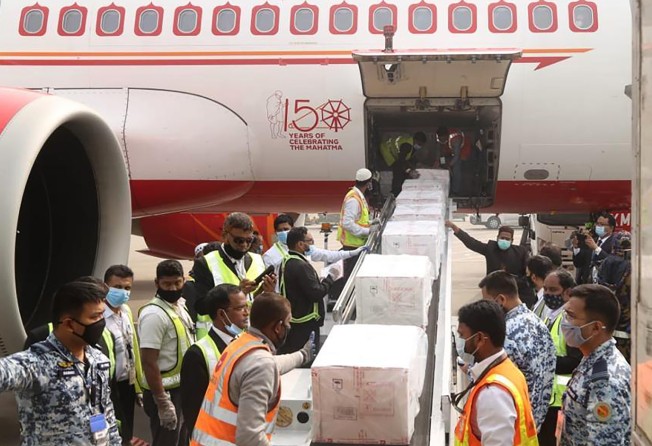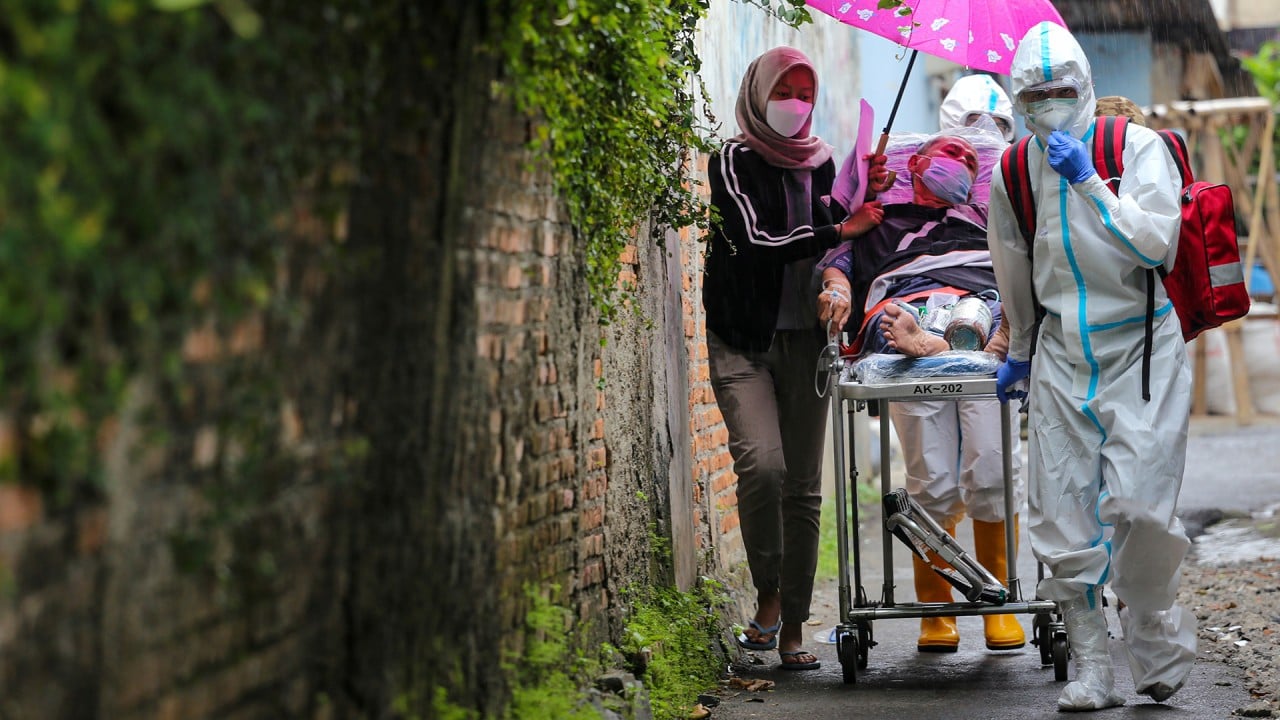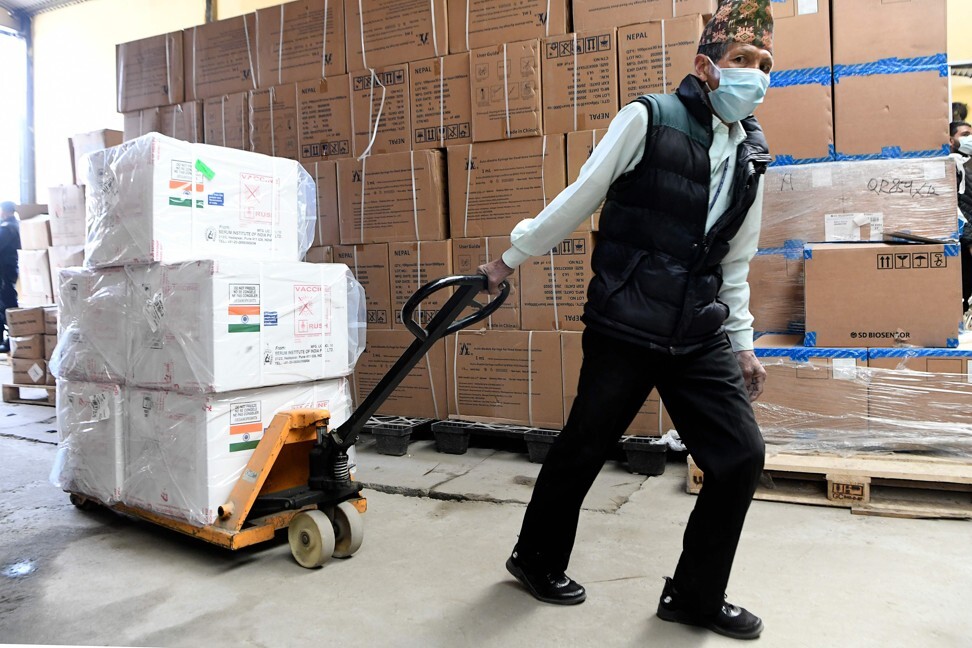Can India outshine China with Covid-19 vaccine diplomacy?
- India is donating millions of AstraZeneca shots to countries including Bangladesh, Sri Lanka, Nepal and Mauritius
- New Delhi says 92 nations including Cambodia, a close ally of Beijing, are interested in vaccines produced by the Serum Institute of India

As India last week announced it would send its neighbours 10 to 20 million doses of Covid-19 vaccines for free, a headline splashed on the Republic, a nationalist and right-wing television channel: “Some Spread Disease, Some Offer Cure”.
It was a reference to the first reports of Covid-19 emerging from the central Chinese city of Wuhan in December 2019 and how more than a year later, New Delhi is using its position as one of the world’s top producers of drugs to match Beijing’s offer of doses to developing countries as a “global public good”.
India’s Serum Institute, the world’s largest producer of vaccines, is producing millions of doses of the shot developed by Oxford University and AstraZeneca. Shipments of free doses under the Vaccine Maitri programme have begun arriving in the Maldives, Nepal, Bhutan, Bangladesh, Myanmar, Mauritius and the Seychelles, while Sri Lanka is next in line for the free shots, branded as Covishield, on January 27, and Cambodia will receive doses next month.
Meanwhile, China has offered free Covid-19 vaccines to Myanmar and the Philippines, and while Bangladesh was supposed to get 110,000 doses of vaccine free from Chinese firm Sinovac Biotech, Dhaka’s refusal to contribute to the vaccine’s development cost led to a deadlock. Authorities in Nepal are still assessing Sinovac’s CoronaVac and have yet to approve its use.
The situation has fuelled a narrative within India of it making headway in a pushback against years of China expanding its influence in the region. The more nationalistic among India’s media outlets – for which China-bashing has been the flavour of the season as the nuclear-armed neighbours are locked in an ongoing military face-off on their Himalayan border – have played up India’s vaccine diplomacy.
When China’s nationalist tabloid Global Times last week suggested Indian drug makers would not be able to fulfil New Delhi’s vaccine diplomacy ambitions, The Times of India, a more centrist publication, ran a piece headlined “China starts smear campaign against India’s vaccine diplomacy”.
To former Indian diplomat Sarvajit Chakrabarty, the headlines “reflect a no-holds barred competition for influence between the two Asian giants”.
“Many Indians see the vaccine as a big opportunity to curb China’s growing influence in South Asia,” said Chakrabarty, who served in the Indian foreign service for 30 years, including as deputy high commissioner and ambassador in several countries, and is now attached to the Kolkata-based think tank CENERS-K.
India is home to half a dozen vaccine manufacturers and produces some 60 per cent of the world’s vaccines. It launched a domestic vaccination programme earlier this month to inoculate 30 million health care workers across the country with Covishield and Covaxin, a home-grown vaccine developed by Bharat Biotech International and the state-run Indian Council of Medical Research, although medical experts remain cautious about the latter, saying it was approved for use without data from late-stage clinical trials.
Foreign secretary Harsh Vardhan Shringla last week said India planned to deliver millions more vaccine doses to countries in South Asia and further afield over the next few weeks, with the first shipment free.
Some 92 nations are also keen to enter into commercial contracts to purchase different vaccines from India, he said.
In addition, India is training health workers in setting up vaccination centres with refrigerated vaccine storage, as well as how to administer doses and look out for reactions.
For some of the recipients, India’s goodwill comes at a time of complex ties.

09:50
SCMP Explains: What's the difference between the major Covid-19 vaccines?
MAKING INROADS?
In Bangladesh, which received 2 million AstraZeneca jabs as a gift and is purchasing another 30 million doses of the same vaccine, India’s role in helping it fight Covid-19 has not gone unnoticed.
The neighbouring countries have experienced tensions in recent years over a controversial Indian citizenship law that marginalises Muslims, including those from Bangladesh, and disagreements over a water-sharing treaty on the Teesta River, a life source for both countries.
Opposition politicians and some media outlets have for the past two months aired doubts about India’s commitment to supply Covid-19 vaccines to Bangladesh, pointing to the collapsed water deal.
But as the vaccines arrived in Dhaka last week, Health Minister Zahid Maleque praised the Serum Institute’s Covishield, saying it was a “huge advantage” that it could be stored and transported at normal refrigerated temperatures, unlike the vaccine developed by Pfizer and BioNTech that requires deep freezing.
Former Bangladesh telecoms and information minister Tarana Halim told This Week in Asia:
“I will only take an Indian vaccine. I will settle for nothing else.”
Sukhoranjan Dasgupta, who has written extensively on Bangladesh, said while ties between the two countries remained “strong” despite the prickly matters, “the vaccines will help Delhi recover any ground it has lost”.
In Nepal, which has been locked in a territorial dispute with India over the strategic border village of Kalapani located on their borders with China, officials said they were grateful for New Delhi’s gifted supplies. The Covishield vaccine has been approved for use in Nepal.
“India has shown goodwill. This is at the people’s level, it is the public who is suffering the most from Covid-19,” said Nepal’s Health Minister Hridayesh Tripathi. Nepal has reported over 269,000 cases and 2,001 deaths.
Meanwhile, China’s Sinopharm is awaiting regulatory approval in Kathmandu for its vaccine, with Santosh KC, spokesman for Nepal’s Department of Drug Administration, telling This Week in Asia last Friday that the drug maker had been asked to “submit more documents and information”.
“You can see who is in lead,” said KC Sunil, a foreign relations analyst at the Kathmandu-based think tank AIDIA. “We know who to turn to when in real trouble.”
The vaccines from India will surely help swing popular sentiment towards India
With New Delhi closely watching how Beijing has grown closer to Nepal’s ruling Communist Party and offered large infrastructure investments and economic aid to the country in recent years, Sabyasachi Basu Ray Chaudhury, the vice-chancellor of Rabindra Bharati University in Kolkata, said the Indian vaccine delivery was well timed.
“With Nepali Prime Minister KP Sharma Oli turning increasingly towards India and his dissolution of the House reportedly done on Indian advice, the struggle for influence with China is real,” said Chaudhury, who is also a commentator on India-Nepal relations. “The vaccines from India will surely help swing popular sentiment towards India.”
IMPACT
Further afield, Cambodia, China’s most reliable ally in Southeast Asia, has asked for 1 million vaccine doses from India after receiving a similar amount from Beijing.
Baladas Ghoshal, a prominent Southeast Asia analyst, said the request was a “huge boost to India’s credibility in Asia”.
“The Chinese are all over in Cambodia and nobody expects its pro-Beijing government to turn to anyone else for anything, so this request for Indian vaccine by Cambodia is very encouraging,” said Ghoshal, the former chairman of the Centre for South and Southeast Asian Studies at Jawaharlal Nehru University, New Delhi.
“Modi’s vaccine diplomacy is all about leveraging our progress in science and pharma … and its priority is clearly the neighbourhood,” said former Indian diplomat Veena Sikri. “No exaggeration, this is India’s moment.”

03:58
Poor countries said to be left behind in Covid-19 vaccine race as rich nations get first doses
But some say the impact of Indian vaccine supplies will be short-lived unless Delhi follows this with more substantive measures like investments, development aid and strategic tie-ups.
Manoj Joshi, a distinguished fellow at the New Delhi think tank Observer Research Foundation, wrote in an opinion piece on The Wire website that India’s gains from vaccine diplomacy will be small, and may not achieve its real aims as China has more might.
While India did not have to counter negative perceptions related to Covid-19 like China, it lacked Beijing’s ability to offer loans and military equipment to win over its neighbours. Even so, no one could begrudge India’s attempt to use what instruments it had to use its vaccines to gain friends and influence in the region, Joshi observed.
Paula Banerjee, who teaches at Calcutta University and closely follows Indian diplomacy, said: “The impact of vaccine diplomacy will surely last for a while but much follow-up action is needed after this is over.
“No scope to rest on one-off laurels.”
